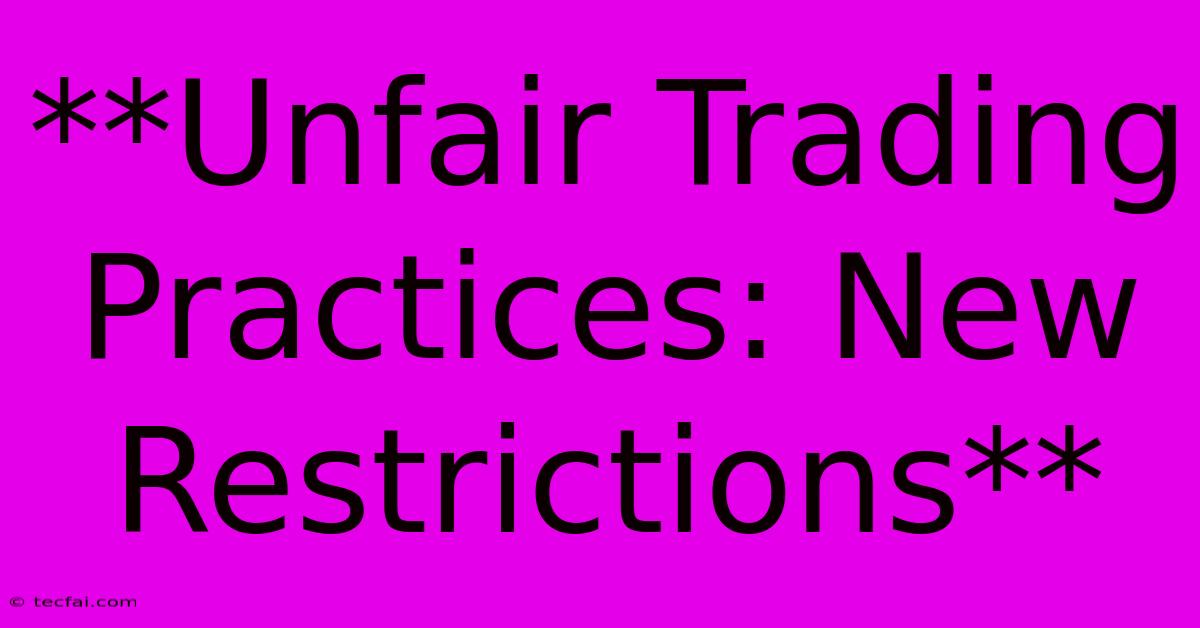**Unfair Trading Practices: New Restrictions**

Discover more detailed and exciting information on our website. Click the link below to start your adventure: Visit Best Website tecfai.com. Don't miss out!
Table of Contents
Unfair Trading Practices: New Restrictions and What They Mean for Businesses
The business landscape is constantly evolving, and with it, the regulations governing fair trade practices. Recent years have seen a surge in legislation aimed at cracking down on unfair trading practices, designed to protect businesses and consumers alike. This article explores the latest restrictions and what they mean for businesses, emphasizing the importance of staying informed and compliant.
What are Unfair Trading Practices?
Unfair trading practices encompass a broad spectrum of activities that can be harmful to businesses, particularly smaller enterprises, and ultimately, consumers. These practices often involve:
- Exploitative contracts: Contracts that unfairly favor one party over another, including unreasonable terms, excessive penalties, or unfair termination clauses.
- Unfair payment terms: Demanding delayed payments or imposing unreasonable deadlines for payment.
- Abusive commercial practices: Engaging in misleading or deceptive marketing, false advertising, or pressuring consumers into unwanted contracts.
- Vertical restraints: Imposing restrictions on suppliers or distributors that limit their options or stifle competition.
New Restrictions: A Global Trend
Across the globe, regulatory bodies are taking a firmer stance against unfair trading practices. Some key initiatives include:
- EU Directive on Unfair Trading Practices in the Food Supply Chain: This directive focuses on protecting farmers and other agricultural businesses from unfair practices by larger players in the supply chain, such as supermarkets.
- UK's Competition Act 1998: This act, with subsequent amendments, addresses issues of unfair trading practices, particularly in relation to market dominance and abuse of power.
- The United States' Antitrust Laws: These laws aim to prevent monopolies, maintain fair competition, and protect consumers from unfair business practices.
Key Takeaways for Businesses:
Staying ahead of the curve regarding unfair trading practices is crucial for any business, big or small. Here are some key takeaways for businesses:
- Be Proactive: Proactively review your contracts and business practices to ensure they align with current regulations.
- Seek Legal Counsel: Consult with legal professionals specializing in competition law and unfair trading practices to understand the specifics of the law in your jurisdiction.
- Educate Your Team: Ensure your team is adequately trained on the implications of unfair trading practices and how to avoid them.
- Stay Informed: Monitor regulatory updates and industry news to remain aware of evolving legislation and best practices.
- Build Strong Relationships: Foster positive relationships with suppliers and customers based on mutual respect and fair dealing.
Benefits of Fair Practices
Adhering to fair trading practices is not merely about avoiding legal repercussions. It fosters a positive business environment by:
- Building trust: Fair practices build trust with customers, suppliers, and partners, leading to long-term relationships.
- Enhancing reputation: A reputation for ethical and fair business practices is a valuable asset in today's market.
- Promoting competition: Fair competition leads to innovation and better products and services for consumers.
Conclusion
The fight against unfair trading practices is an ongoing battle, with new regulations and initiatives emerging regularly. Businesses must be proactive in understanding and complying with these changes. By fostering a culture of ethical and fair business practices, companies can build a strong foundation for success, contribute to a healthier market, and ultimately benefit from a more sustainable business environment.

Thank you for visiting our website wich cover about **Unfair Trading Practices: New Restrictions**. We hope the information provided has been useful to you. Feel free to contact us if you have any questions or need further assistance. See you next time and dont miss to bookmark.
Featured Posts
-
Jillaroos Selection Impresses In Kiwi Ferns Test
Oct 29, 2024
-
Kim North Attend Tyler The Creators Event
Oct 29, 2024
-
2025 Pip Changes What Claimants Need To Know
Oct 29, 2024
-
Man United Manager Search After Champions League
Oct 29, 2024
-
Biro Ni Estrada Tungkol Sa Drug War Hindi Natuwa Si Hontiveros
Oct 29, 2024
